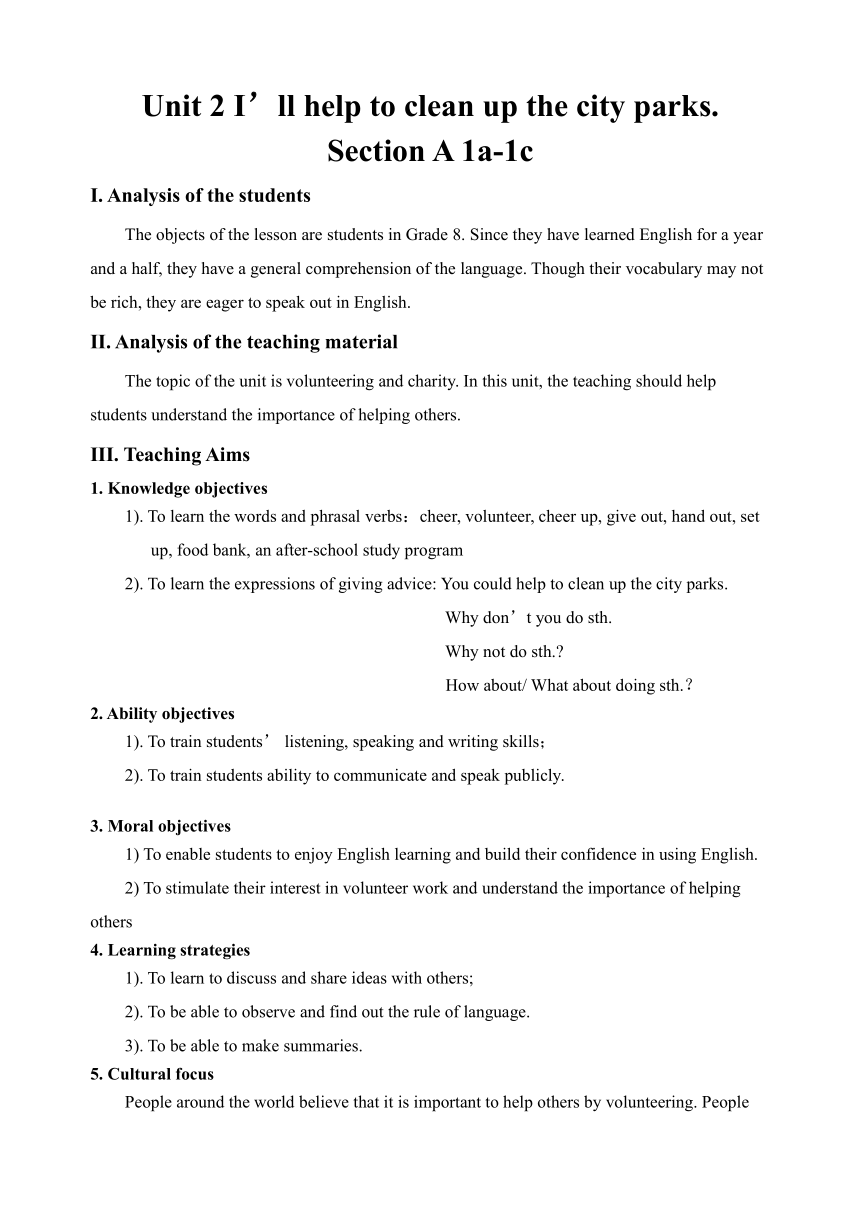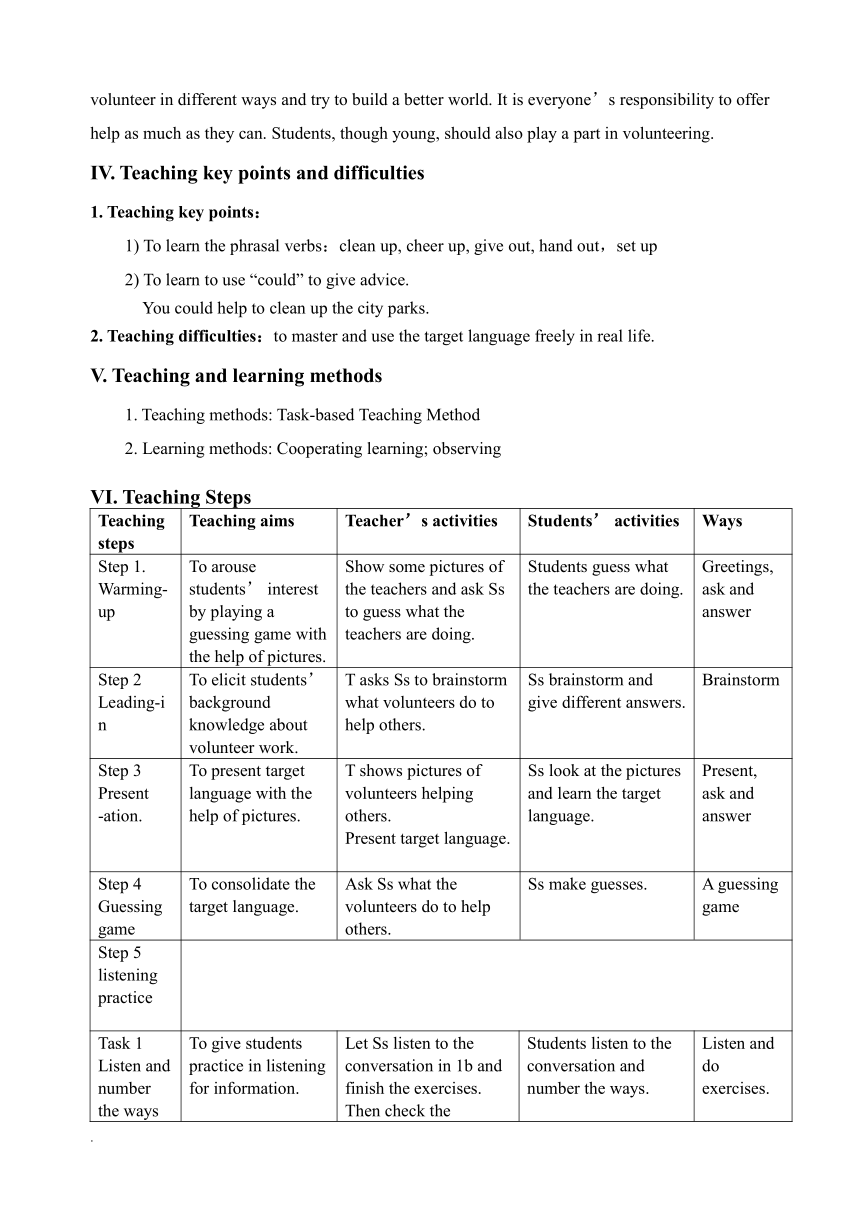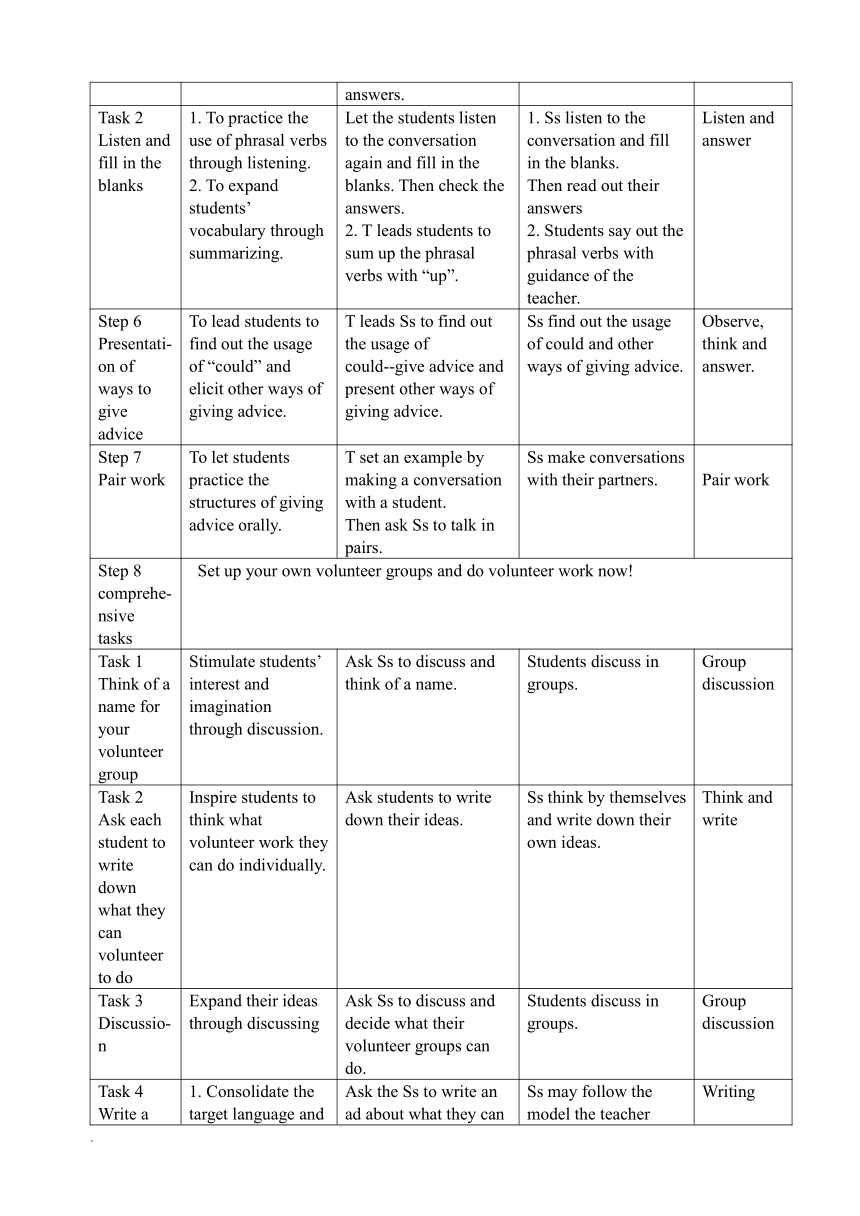人教版八年级下册 Unit2 I'll help to clean up the city parks? SectionA 1a-1c (教案+学案)
文档属性
| 名称 | 人教版八年级下册 Unit2 I'll help to clean up the city parks? SectionA 1a-1c (教案+学案) |

|
|
| 格式 | doc | ||
| 文件大小 | 82.5KB | ||
| 资源类型 | 教案 | ||
| 版本资源 | 人教新目标(Go for it)版 | ||
| 科目 | 英语 | ||
| 更新时间 | 2022-12-20 00:00:00 | ||
图片预览



文档简介
Unit 2 I’ll help to clean up the city parks.
Section A 1a-1c
I. Analysis of the students
The objects of the lesson are students in Grade 8. Since they have learned English for a year and a half, they have a general comprehension of the language. Though their vocabulary may not be rich, they are eager to speak out in English.
II. Analysis of the teaching material
The topic of the unit is volunteering and charity. In this unit, the teaching should help students understand the importance of helping others.
III. Teaching Aims
1. Knowledge objectives
1). To learn the words and phrasal verbs:cheer, volunteer, cheer up, give out, hand out, set up, food bank, an after-school study program
2). To learn the expressions of giving advice: You could help to clean up the city parks.
Why don’t you do sth.
Why not do sth.
How about/ What about doing sth.?
2. Ability objectives
1). To train students’ listening, speaking and writing skills;
2). To train students ability to communicate and speak publicly.
3. Moral objectives
1) To enable students to enjoy English learning and build their confidence in using English.
2) To stimulate their interest in volunteer work and understand the importance of helping others
4. Learning strategies
1). To learn to discuss and share ideas with others;
2). To be able to observe and find out the rule of language.
3). To be able to make summaries.
5. Cultural focus
People around the world believe that it is important to help others by volunteering. People volunteer in different ways and try to build a better world. It is everyone’s responsibility to offer help as much as they can. Students, though young, should also play a part in volunteering.
IV. Teaching key points and difficulties
1. Teaching key points:
1) To learn the phrasal verbs:clean up, cheer up, give out, hand out,set up
2) To learn to use “could” to give advice.
You could help to clean up the city parks.
2. Teaching difficulties:to master and use the target language freely in real life.
V. Teaching and learning methods
1. Teaching methods: Task-based Teaching Method
2. Learning methods: Cooperating learning; observing
VI. Teaching Steps
Teaching steps Teaching aims Teacher’s activities Students’ activities Ways
Step 1. Warming-up To arouse students’ interest by playing a guessing game with the help of pictures. Show some pictures of the teachers and ask Ss to guess what the teachers are doing. Students guess what the teachers are doing. Greetings, ask and answer
Step 2 Leading-in To elicit students’background knowledge about volunteer work. T asks Ss to brainstorm what volunteers do to help others. Ss brainstorm and give different answers. Brainstorm
Step 3Present-ation. To present target language with the help of pictures. T shows pictures of volunteers helping others. Present target language. Ss look at the pictures and learn the target language. Present, ask and answer
Step 4 Guessing game To consolidate the target language. Ask Ss what the volunteers do to help others. Ss make guesses. A guessing game
Step 5 listening practice
Task 1 Listen and number the ways To give students practice in listening for information. Let Ss listen to the conversation in 1b and finish the exercises.Then check the answers. Students listen to the conversation and number the ways. Listen and do exercises.
Task 2 Listen and fill in the blanks 1. To practice the use of phrasal verbs through listening.2. To expand students’ vocabulary through summarizing. Let the students listen to the conversation again and fill in the blanks. Then check the answers.2. T leads students to sum up the phrasal verbs with “up”. 1. Ss listen to the conversation and fill in the blanks. Then read out their answers2. Students say out the phrasal verbs with guidance of the teacher. Listen and answer
Step 6 Presentati-on of ways to give advice To lead students to find out the usage of “could” and elicit other ways of giving advice. T leads Ss to find out the usage of could--give advice and present other ways of giving advice. Ss find out the usage of could and other ways of giving advice. Observe, think and answer.
Step 7Pair work To let students practice the structures of giving advice orally. T set an example by making a conversation with a student. Then ask Ss to talk in pairs. Ss make conversations with their partners. Pair work
Step 8 comprehe-nsive tasks Set up your own volunteer groups and do volunteer work now!
Task 1Think of a name for your volunteer group Stimulate students’ interest and imagination through discussion. Ask Ss to discuss and think of a name. Students discuss in groups. Group discussion
Task 2 Ask each student to write down what they can volunteer to do Inspire students to think what volunteer work they can do individually. Ask students to write down their ideas. Ss think by themselves and write down their own ideas. Think and write
Task 3Discussio-n Expand their ideas through discussing Ask Ss to discuss and decide what their volunteer groups can do. Students discuss in groups. Group discussion
Task 4 Write a report 1. Consolidate the target language and train students’ ability to write.2. Train students’ ability to summarize. Ask the Ss to write an ad about what they can do to help. Ss may follow the model the teacher gives to write an add. Writing
Task 5. Ask some students to make reports in class. Train students’ speaking skills and share their work with others. Ask some Ss to give a speech, reading out the report and sharing their ideas. Ss read out the reports in class. Make a speech
Step 9Moral education Raise students’ awareness of helping others. Encourage students to do volunteer work as a group and play their own part in helping make the world more beautiful. Students understand the importance of helping others.
Step 10. Summary. Summarize the target language so that students can have a clear picture of what they learned in the period. The teacher summarizes the phrasal verbs and the ways to give advice. Ss follow the teacher to summarize what they learned in the class. Summarize
Blackboard Design
Unit 2 I’ll help to clean up the city parks.
Unit 2 I’ll help to clean up the city parks
Section A 1a-1c学案
1. Listening task
1) 1b. Listen and number the ways the boy and girl could help others.
___ The girl could visit the sick kids in the hospital to cheer them up.
___ The boy could give out food at the food bank.
___ The girl could volunteer in an after-school study program to teach kids.
___ The boy could help to clean up the city parks.
2) 1b. Listen and fill in the blanks.
The girl could visit the sick kids in the hospital to ________them_________.
The boy could _________ ________food at the food bank.
The girl could __________ in an after-school study program to teach kids.
The boy could _______ _________ ________ ________the city parks.
2. Comprehensive tasks.
Volunteer work makes the city more beautiful. As students, we can play our part in volunteering. We can set up our own volunteer groups to help more people.
Let’s set up our own volunteer groups!
1). Step one: think of a name for your volunteer group and decide when and where to volunteer as a group.
Name: __________________________
Time: ___________________________
Place: ___________________________
2). Step two: write down what you can volunteer to do.
I can _____________________________________________________________.
I can _____________________________________________________________
3). Step three: discussion
Discuss with your group members and decide what your group can volunteer to do. You can take notes when you discuss.
A: What can we volunteer to do
B: We can/ could …
C: What about…
D: How about…
…
Notes :_______________________________________________________________ _____________________________________________________________________ __________________________________________________________________________________________________________________________________________
_____________________________________________________________________
4). Step four: write an ad for your volunteer group
We are ______________________. We love to help others. We do volunteer work_________________________________________________________________
__________________________________________________________________________________________________________________________________________________________________________________________________________________________________________________________________________________________________________________________________________________________________________________________________________________________________________________________________________________________________
Do you want to be a volunteer If yes, come and join us!
Give advice
You could do sth..
Why don’t you do sth.
Why not do sth.
How about/What about doing sth.
Phrasa verbs
cheer sb. up – make sb. happy
clean sth. up
set up
give out-- hand out
PAGE
.
Section A 1a-1c
I. Analysis of the students
The objects of the lesson are students in Grade 8. Since they have learned English for a year and a half, they have a general comprehension of the language. Though their vocabulary may not be rich, they are eager to speak out in English.
II. Analysis of the teaching material
The topic of the unit is volunteering and charity. In this unit, the teaching should help students understand the importance of helping others.
III. Teaching Aims
1. Knowledge objectives
1). To learn the words and phrasal verbs:cheer, volunteer, cheer up, give out, hand out, set up, food bank, an after-school study program
2). To learn the expressions of giving advice: You could help to clean up the city parks.
Why don’t you do sth.
Why not do sth.
How about/ What about doing sth.?
2. Ability objectives
1). To train students’ listening, speaking and writing skills;
2). To train students ability to communicate and speak publicly.
3. Moral objectives
1) To enable students to enjoy English learning and build their confidence in using English.
2) To stimulate their interest in volunteer work and understand the importance of helping others
4. Learning strategies
1). To learn to discuss and share ideas with others;
2). To be able to observe and find out the rule of language.
3). To be able to make summaries.
5. Cultural focus
People around the world believe that it is important to help others by volunteering. People volunteer in different ways and try to build a better world. It is everyone’s responsibility to offer help as much as they can. Students, though young, should also play a part in volunteering.
IV. Teaching key points and difficulties
1. Teaching key points:
1) To learn the phrasal verbs:clean up, cheer up, give out, hand out,set up
2) To learn to use “could” to give advice.
You could help to clean up the city parks.
2. Teaching difficulties:to master and use the target language freely in real life.
V. Teaching and learning methods
1. Teaching methods: Task-based Teaching Method
2. Learning methods: Cooperating learning; observing
VI. Teaching Steps
Teaching steps Teaching aims Teacher’s activities Students’ activities Ways
Step 1. Warming-up To arouse students’ interest by playing a guessing game with the help of pictures. Show some pictures of the teachers and ask Ss to guess what the teachers are doing. Students guess what the teachers are doing. Greetings, ask and answer
Step 2 Leading-in To elicit students’background knowledge about volunteer work. T asks Ss to brainstorm what volunteers do to help others. Ss brainstorm and give different answers. Brainstorm
Step 3Present-ation. To present target language with the help of pictures. T shows pictures of volunteers helping others. Present target language. Ss look at the pictures and learn the target language. Present, ask and answer
Step 4 Guessing game To consolidate the target language. Ask Ss what the volunteers do to help others. Ss make guesses. A guessing game
Step 5 listening practice
Task 1 Listen and number the ways To give students practice in listening for information. Let Ss listen to the conversation in 1b and finish the exercises.Then check the answers. Students listen to the conversation and number the ways. Listen and do exercises.
Task 2 Listen and fill in the blanks 1. To practice the use of phrasal verbs through listening.2. To expand students’ vocabulary through summarizing. Let the students listen to the conversation again and fill in the blanks. Then check the answers.2. T leads students to sum up the phrasal verbs with “up”. 1. Ss listen to the conversation and fill in the blanks. Then read out their answers2. Students say out the phrasal verbs with guidance of the teacher. Listen and answer
Step 6 Presentati-on of ways to give advice To lead students to find out the usage of “could” and elicit other ways of giving advice. T leads Ss to find out the usage of could--give advice and present other ways of giving advice. Ss find out the usage of could and other ways of giving advice. Observe, think and answer.
Step 7Pair work To let students practice the structures of giving advice orally. T set an example by making a conversation with a student. Then ask Ss to talk in pairs. Ss make conversations with their partners. Pair work
Step 8 comprehe-nsive tasks Set up your own volunteer groups and do volunteer work now!
Task 1Think of a name for your volunteer group Stimulate students’ interest and imagination through discussion. Ask Ss to discuss and think of a name. Students discuss in groups. Group discussion
Task 2 Ask each student to write down what they can volunteer to do Inspire students to think what volunteer work they can do individually. Ask students to write down their ideas. Ss think by themselves and write down their own ideas. Think and write
Task 3Discussio-n Expand their ideas through discussing Ask Ss to discuss and decide what their volunteer groups can do. Students discuss in groups. Group discussion
Task 4 Write a report 1. Consolidate the target language and train students’ ability to write.2. Train students’ ability to summarize. Ask the Ss to write an ad about what they can do to help. Ss may follow the model the teacher gives to write an add. Writing
Task 5. Ask some students to make reports in class. Train students’ speaking skills and share their work with others. Ask some Ss to give a speech, reading out the report and sharing their ideas. Ss read out the reports in class. Make a speech
Step 9Moral education Raise students’ awareness of helping others. Encourage students to do volunteer work as a group and play their own part in helping make the world more beautiful. Students understand the importance of helping others.
Step 10. Summary. Summarize the target language so that students can have a clear picture of what they learned in the period. The teacher summarizes the phrasal verbs and the ways to give advice. Ss follow the teacher to summarize what they learned in the class. Summarize
Blackboard Design
Unit 2 I’ll help to clean up the city parks.
Unit 2 I’ll help to clean up the city parks
Section A 1a-1c学案
1. Listening task
1) 1b. Listen and number the ways the boy and girl could help others.
___ The girl could visit the sick kids in the hospital to cheer them up.
___ The boy could give out food at the food bank.
___ The girl could volunteer in an after-school study program to teach kids.
___ The boy could help to clean up the city parks.
2) 1b. Listen and fill in the blanks.
The girl could visit the sick kids in the hospital to ________them_________.
The boy could _________ ________food at the food bank.
The girl could __________ in an after-school study program to teach kids.
The boy could _______ _________ ________ ________the city parks.
2. Comprehensive tasks.
Volunteer work makes the city more beautiful. As students, we can play our part in volunteering. We can set up our own volunteer groups to help more people.
Let’s set up our own volunteer groups!
1). Step one: think of a name for your volunteer group and decide when and where to volunteer as a group.
Name: __________________________
Time: ___________________________
Place: ___________________________
2). Step two: write down what you can volunteer to do.
I can _____________________________________________________________.
I can _____________________________________________________________
3). Step three: discussion
Discuss with your group members and decide what your group can volunteer to do. You can take notes when you discuss.
A: What can we volunteer to do
B: We can/ could …
C: What about…
D: How about…
…
Notes :_______________________________________________________________ _____________________________________________________________________ __________________________________________________________________________________________________________________________________________
_____________________________________________________________________
4). Step four: write an ad for your volunteer group
We are ______________________. We love to help others. We do volunteer work_________________________________________________________________
__________________________________________________________________________________________________________________________________________________________________________________________________________________________________________________________________________________________________________________________________________________________________________________________________________________________________________________________________________________________________
Do you want to be a volunteer If yes, come and join us!
Give advice
You could do sth..
Why don’t you do sth.
Why not do sth.
How about/What about doing sth.
Phrasa verbs
cheer sb. up – make sb. happy
clean sth. up
set up
give out-- hand out
PAGE
.
同课章节目录
- Unit 1 What's the matter?
- Section A
- Section B
- Unit 2 I'll help to clean up the city parks.
- Section A
- Section B
- Unit 3 Could you please clean your room?
- Section A
- Section B
- Unit 4 Why don't you talk to your parents?
- Section A
- Section B
- Unit 5 What were you doing when the rainstorm came
- Section A
- Section B
- Review of Units 1-5
- Unit 6 An old man tried to move the mountains.
- Section A
- Section B
- Unit 7 What's the highest mountain in the world?
- Section A
- Section B
- Unit 8 Have you read Treasure Island yet?
- Section A
- Section B
- Unit 9 Have you ever been to a museum?
- Section A
- Section B
- Unit 10 I've had this bike for three years.
- Section A
- Section B
